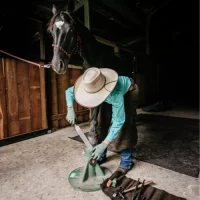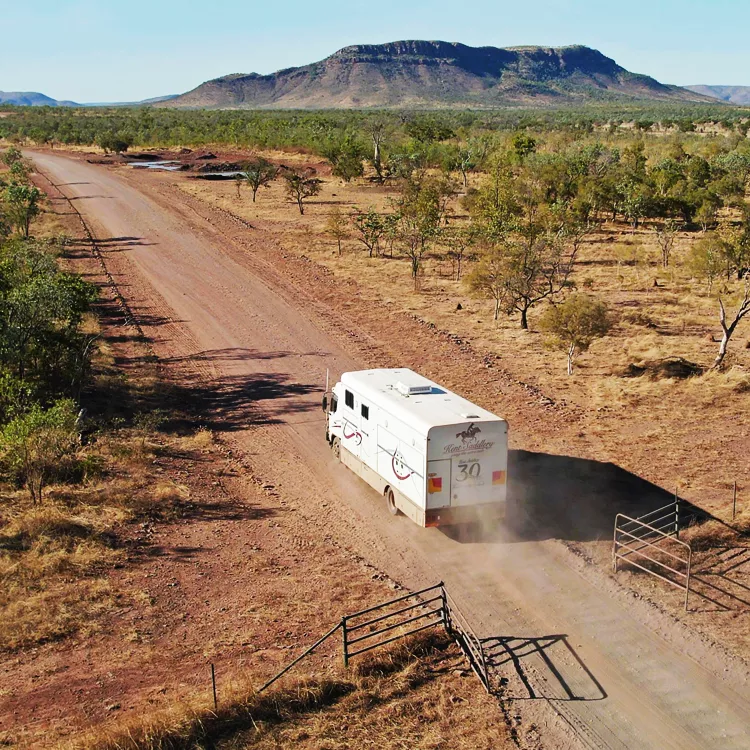Leopold Downs Station, Fitzroy Crossing, WA
Ned McCord
“A Growing Thing”
Ned McCord is a man of momentum, and thrives in the midst of circumstances well described as challenging. Ned was brought up near Eidsvold, QLD on Coonambula Station, which had been in the family for one hundred and ten years when it was sold. He attended the Southport School, leaving after year 10 to attend the Emerald Pastoral College for two years.
In 1975, Ned began jackarooing at Bradshaw Station, NT (before the army acquired it for training purposes). The manager, Rowley Walker “was a great boss and taught me a lot.” Ned stayed for four years, and worked with indigenous stockmen; “I was the only white fella in the stock camp.” Later on, this experience probably served as a catalyst in the choices that Ned made regarding his life direction. He completed shorter amounts of time at Davenport Downs, Western QLD and Mataranka Station, NT, and was then ready to head for the Kimberley. On the way he called in at Bradshaw, “to say hello to the Walker family. I ended up staying five more years….. this time as headstockman/overseer.”
In another boomerang decision, Ned managed Mataranka for two years until the Israeli Consortium, which also owned Bradshaw, sold the station, and it was time to move on. This presented an opportunity for a change of scenery, and Ned travelled overseas; visiting Britain, Europe and the USA. While in San Francisco he received a call from Sir William Gunn, asking if he’d do some contract mustering at Roper Valley and Mataranka Stations, and at twenty six years of age, Ned returned to his only possessions, “a few horses, a car and my saddle,” and a job in familiar country.
By the early 1980’s, Ned had ventured into the “arena” of bull catching, and his possessions now consisted of bull catchers, trucks, more horses, and significantly more savings than when he returned from overseas. Looking for an investment opportunity, Ned bought Bauhinia Downs Station, Near Boorolloola, NT, in 1984, “and at the same time married Bernadette.”
Ned recalls that, following their wedding in Melbourne, they travelled North, honeymooning in Coolangatta for a night, before driving from Brisbane to Bauhinia, where a big cyclone had just been through. They became bogged four miles out from the homestead, and their first night “on the farm” was made memorable by attempts to dig the car out, and then walking through mud to their new home. Ned laughingly recalls…… “when we arrived in the pitch dark, we were trying to get the old lighting plant going. There was spilled fuel everywhere, and Bernadette was lighting matches so I could find the crank handle!” The fact that his new wife passed this “test” probably assured Ned that in marrying Bernadette, he’d made another good investment.
Ready for an opportunity to do something different, Ned then agreed to manage Mittiebah Station, N.T, at the request of a former boss, friend and mentor, Wally Munro. Ned’s good friend John Mora stepped in to the management position at Bauhinia, and Ned and Bernadette spent eight years at Mittiebah, where Ned also committed to manage the Monro’s Tobermory Station….. “a very busy time.” Eight years later, Ned and Bernadette made two more decisions. Firstly, they sold Bauhinia to the government, who wanted to purchase it on behalf of the indigenous people of that area. Ned remembers clearly that negotiations for that sale took place under a gidgee tree at Tobermory.
At the same time, Ned was approached to take on the senior management role of the Tipperary Group of Stations in the NT. John Mora came to manage Mittiebah, and the McCord’s shifted to Tipperary in the Douglas Daly River Region. They stayed from the end of 1995 until 2000, and Ned describes the time at Tipperary as “good, but a big job. “I was never at home….. a bit like here!” (Leopold Downs).
During these years their three children, Sarah 1990, Luke 1992 and Tom 1993 “arrived on the scene” Their education has been acquired in play groups, schools and universities from one end of the country to the other.
From “the long time ago,” when his journey to the Kimberley had been interrupted, Ned had “always wanted to come West,” so when approached by the Indigenous Land Council to run Roebuck Plains, near Broome, WA, Ned fulfilled that part of his dream. Two years later, with the accumulation of experience gained during years of working in the bush, Ned established his own consultancy business, Kimberley Rural Management and Training, based in Broome, and Bernadette was able to continue a career in nursing. This marked the beginning of a chain of events which led to Ned’s involvement with an amazing and unlikely connection between the descendents of Australia’s first citizens, the Aboriginal people, and other multi cultural Australian citizens of the twenty first century.
The link began with a vision of the Bunuba Aboriginal people; to provide a learning centre which would engage indigenous youth in activities to preserve their culture, while receiving formal education in a largely “hands on” way. Helen Drennen, the principal of Wesley College, Melbourne, had met some Bunuba people, and their endeavours captured her interest. Another significant “tree meeting” eventuated; this time, under a gum tree at Fairfield Station. Joe Ross, Senior Bunuba man, and Helen Drennen, arrived to discuss education with Ned, who happened to be mustering at the station. At this meeting, the vision was realized; to link the students of Wesley College with indigenous students from the bush, and the Yiramalay/Wesley Studio school, now fully registered and self funded, became a reality. The school operates as a moving Studio, and students spend alternating terms in Melbourne and at Yiramalay. The unique partnership brings together students from geographically and culturally opposite ends of Australia, to spend time in each other worlds. Ironically, for someone who admits that “education hasn’t been a big part of my life,” the title of “Executive Director of Yiramalay/Wesley Studio School,” causes Ned to smile. It’s an amazing and innovative concept, and has taken up most of Ned’s time for the past eight years, to the point where he jokingly says “I’ve been swallowed up by it.”
Ned gains a lot of satisfaction from training and working with young people, using and teaching “pressure on, pressure off” stock handling methods to reinforce the need for mutual respect, team work, and the development of leadership skills. Ned’s right hand man is Malcolm Lee, Assistant Manager, and also headstockman, grader driver, teacher’s assistant, and mentor.
(For a more detailed explanation of Ned’s insights, gained and learned during many years of experiance, see the article, “Yiramalay Coacher Mustering” by Ned McCord, 2011.)
Leopold Downs, purchased by the Bunuba people in 1991, is a dramatically beautiful piece of country, encompassing both the Devonian Reef and some King Leopold Ranges Country. Neighbouring Fairfield Station was purchased by Bunuba in 1995, and the total land area of the two stations is 4891 sq km. The Bunuba Cattle Company was established in 1991, to operate the cattle enterprise, and Ned works closely with June Oscar and Marty Stevens in the venture. Respectively, they fulfil the roles of Chairperson and Director of Bunuba Cattle Company. Four hundred thousand acres is to be “locked up” for conservation and significant cultural areas, and Ned is confident there is still plenty of good grazing land for cattle operations. He estimates there are twenty four thousand head of cattle at the station, including eight thousand “wild” cattle.
Ned is currently keen to share the work load by delegating leadership roles to other equipped people, and he remains excited and enthusiastic about the future of Bunuba. A link with the Victorian deaf school has added a new dynamic to the Yiramalay/Wesley school, and along with plans for a tourism venture at Fairfield Station near Tunnel Creek, and a micro business concentrating on the propagation of native plants, the program is full of promise and hope. Ned sees himself as “a facilitator, sometimes a driver, not always popular, and willing to step back when needed.”
It’s eight years since Ned first walked up the path to the Leopold Downs homestead, and was met at the door by a Brahman cow. A family of peacocks also had to be evicted, reinforcing what Ned already knew…… a lot of work lay ahead. The Studio school operates on a principle of “moving with the seasons,” aligning with the Yiramalay culture. Ned has committed to be adaptable and understanding during the seasons of change and development of the Bunuba projects, and shares in a common desire for a good life for the next generation.
He is equally passionate about “creating opportunities for youth, and linking the bush to the city.” He pauses to consider for a moment, then voices his conviction and dedication to the Bunuba venture with four final words. “It’s a growing thing.”
* Yiramalay is the aboriginal name for spring















